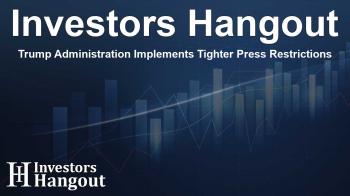Trump Administration Implements Tighter Press Restrictions

Stricter Press Regulations in the West Wing
Recently, the Trump administration has enforced tighter controls over press access within the West Wing, which has implications for how journalists operate. Reporters are now required to obtain prior approval before entering certain key workspaces, particularly those near classified discussions. This shift is defended by officials who claim enhanced security measures are essential due to the proximity of communication aides to sensitive national security information.
Press Movement Restrictions
A memo addressed to Communications Director Steven Cheung and Press Secretary Karoline Leavitt from the National Security Council announced that journalists are prohibited from entering Room 140 without prior appointments. This space has historically been a common point for reporters seeking to engage with top officials.
Concerns About Transparency
This new rule has sparked debates concerning transparency and press freedom. While the administration insists that these changes are necessary for maintaining national security, critics argue that they pose significant barriers to reporters attempting to fulfill their journalistic duties.
Impact of Security on Journalistic Freedom
The communications office's physical proximity to the Oval Office has long been a strategic location for press interactions. Unscheduled visits by reporters were common, enabling them to ask questions on short notice. The new policy disrupts this practice, mandating that reporters schedule their engagements in advance, which many fear could dampen the spontaneity of press inquiries.
Previous Responses from the Pentagon
This shift in press policy mirrors recent changes implemented at the Pentagon, where similar restrictions were established. In that case, reporters faced penalties, including the loss of offices and credentials, for not complying with newly introduced regulations. More than thirty news organizations have voiced their concerns over these oppressive changes, which could stifle the ability to gather and disseminate information effectively.
Potential Threats to Press Credentials
Adding to the apprehension, the Pentagon's policies suggest that reporters could be classified as security risks if they seek sensitive or classified information from personnel. Media advocates have criticized such vague language, arguing that it could discourage rigorous investigative journalism and create a chilling effect within the media landscape.
Broader Implications for Journalistic Integrity
As these policies unfold, many are left wondering about the implications for journalistic integrity and watchdog functions within the government. While security is vital, free access to information remains equally important in a democratic society. The balance between safeguarding sensitive information and allowing for journalistic inquiry is a challenging one, and how the administration navigates this terrain will likely be scrutinized moving forward.
Frequently Asked Questions
Why has the Trump administration increased press restrictions?
The administration cites the need to protect sensitive national security information as the primary reason for tighter controls on press access.
What specific areas are now off-limits to journalists?
Reporters can no longer access Room 140 without prior approval, as this space is located near classified discussions.
How have previous press policies affected journalists?
Prior restrictions at the Pentagon led to significant pushback from media organizations concerned about transparency and press freedom.
Could these policies impact journalistic investigations?
Many media advocates believe that the vague language regarding security risks could chill investigative efforts by journalists.
Is there a balance between security and press freedom?
Finding a balanced approach where sensitive information is protected while maintaining press freedoms is essential to uphold democratic values.
About The Author
Contact Ryan Hughes privately here. Or send an email with ATTN: Ryan Hughes as the subject to contact@investorshangout.com.
About Investors Hangout
Investors Hangout is a leading online stock forum for financial discussion and learning, offering a wide range of free tools and resources. It draws in traders of all levels, who exchange market knowledge, investigate trading tactics, and keep an eye on industry developments in real time. Featuring financial articles, stock message boards, quotes, charts, company profiles, and live news updates. Through cooperative learning and a wealth of informational resources, it helps users from novices creating their first portfolios to experts honing their techniques. Join Investors Hangout today: https://investorshangout.com/
The content of this article is based on factual, publicly available information and does not represent legal, financial, or investment advice. Investors Hangout does not offer financial advice, and the author is not a licensed financial advisor. Consult a qualified advisor before making any financial or investment decisions based on this article. This article should not be considered advice to purchase, sell, or hold any securities or other investments. If any of the material provided here is inaccurate, please contact us for corrections.

